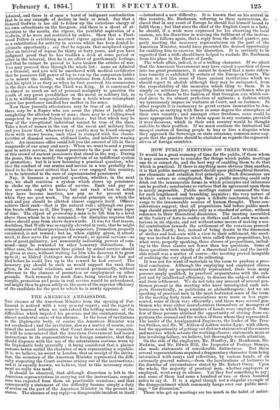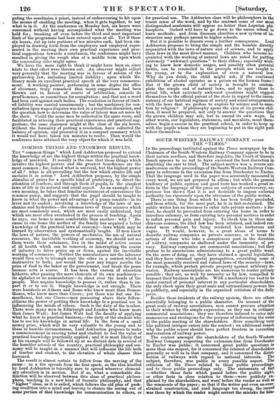HOW PUBLIC MEETINGS DO THEIR, WORK.
IT would be a great economy of time for the public, if those whom it may concern were to consider the things which public meetings can do or cannot do, and the best way of enabling them to do that which is practical. If there is anything more obvious than another, it is that public meetings caunot decide upon philosophical theories, nor eliminate and establish first principles. Such discussions are in their nature so complicated, that a piiblic'ineeting could only fetch out the innumerable forms in which principles and inferences can be posited; conclusions so various that an agreement upon them is nearly impossible. Public meetings cannot command the time
for such lengthened and branching ; the very nature of which is, not to concentrate upon a definite conclusion, ut to di- verge to the innumerable sources of human thought. hese con- siderations suggest, that all propositions laid before public meet- inga should present principles only as a standard of action, without reference to their theoretical discussion. The meeting assembled at the Society of Arts to confer on Strikes and Lock-outs was meri- torious in its objects, and not without some means of making a use- ful contribution towards the settlement of the vexatious proceed- ings in the North ; but, instead of being: dreier' to the discussion of strikes and lock-outs with a view to their settlement, the meet- ing was invited to discuss what were called three propositions, but what were, properly speaking, three classes of propositions, includ- ing in the three classes not fewer than ten questions. Some of these questions were strictly of a theoretical kind ; and the inevit- able result was a matter of course—the meeting proved incapable of realizing the very object of its collecting. It was not for want of materials in the room to produce a prac- tical conclusion. Although the employing and employed classes were not fully or proportionately represented, there were many persons amply- qualified, by practical acquaintance with the sub- ject and by intellectual efficiency, to discuss the subject of strikes and their settlement. We do not take any account of several gen- tlemen present in the meeting who have investigated such sub- jects theoretically, as politicians or philanthropists; but we are speaking of practical men in the most restricted sense of the term. In the meeting forty trade associations were more or less repre- sented, some of them very efficiently ; and there were several gen- tlemen who were either manufacturers themselves or managers of businesses in which large numbers of hands were employed. Some few of these persons obtained the opportunity of stating from ex- perience the counsel and the wishes of those whom they represented. The leader of the Amalgamated Engineers, the leader of the Pres- ton Strikes, and Mr. W. Aitken of Ashton-under-Lyne, with others, had the opportunity of getting out distinct statements of the reasons and motives which actuate the working-classes ; statements more or less involving fallacy, we believe, but thoroughly worth attention.
On the side of the employers, Mr. Hindley, Mr. Henderson, Mr. Medwin, and Mr. Edwin Hill, the Inspector of Postage Stamps, also made statements of considerable distinctness. But these several representations acquired a fragmentary character from being intermixed with essays and reflections, by various hands, of an extremely general nature,—from the lucubrations of lecturers to the doctrine of circumstances stated by Mr. Robert Owen. Upon the whole, the majority of practical men, whether employers or employed, went away in silence. Yet they had something to say; and some of them had come a hundred or two or three hundred miles to say it. It is a signal though not a singular example of the disappointment which commonly hangs over our public meet- ings "for discussion." Those who get up meetings are too much in the habit of antici- pating the conclusion priori, instead of endeavouring to hit upon the means of enabling the meeting, when it gets together, to say what is in it. At the conference on Monday last, six hours were consumed without having accomplished what the meeting was held for ; breaking off even before the third and most important limb of the programme had been entered upon at all. Yet if those six hours, cut up into portions of ten minutes each, had been em- ployed in drawing forth from the employers and employed repre- sented in the meeting their own practical experience and prac- tical suggestions towards a conclusion, the conference might have resulted in giving the rough idea of a middle term upon which the contending sides might agree.
We have the more right to think it might have been so, since hints to that effect were thrown out. An observer might collect very generally that the meeting was in favour of reform of the partnership law, including limited liability ; upon which Mr. Blaney made an excellent practical speech at the very commence- ment. A working painter, performing in some degree the office of chairman, truly remarked that many suggestions had been thrown out in favour of courts of arbitration, conseih de prud'hommes, or committees for conseltation ; and that not a word had been said against such bodies. The resolution in favour of limit- ed liability was carried unanimously ; but the machinery for con- sultation upon wages disputes was lost in a resultless discussion, and the question how to determine the value of labour was set aside by the clock. Could the same men be collected in the same room, and facilitated in uttering their practical experiences and practical sug- gestions, the same chairman might at the close of the six hours, without the formality of putting a resolution, have collected the balance of opinion, and presented it in a compact summary which it would not have taken ten minutes to recite. Then would the conference have attained the very object for which it was held.



































 Previous page
Previous page